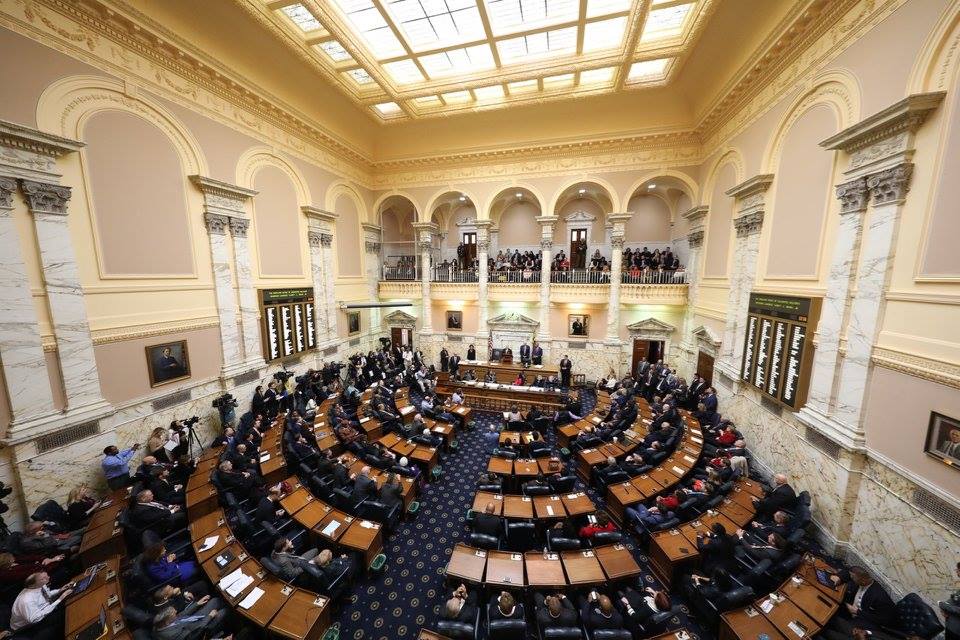Maryland House passes $46.7 billion budget
By Diane Rey
For Maryland Reporter
State support for public schools will exceed $7 billion for the first time in a budget plan given preliminary approval Wednesday by the Maryland House of Delegates.
The $46.7 billion state budget bill for fiscal 2020 also includes a 3% general salary increase for state workers (5% for law enforcement officers) effective July 1.
Education is the big winner in the House plan, allocating $500 million for school construction and $320 million to begin funding recommendations coming out of the Kirwan Commission report to enhance education, expand public preschool, and raise teacher salaries.
It also keeps more than $1.2 billion in cash resources, including $1.1 billion in the Rainy Day Fund and $120.1 million in the General Fund.
It does not contain any new taxes.
House Appropriations Committee Chair Maggie McIntosh, D-Baltimore City, gave a brief summary of the budget before presenting the amendments — 188 were considered Wednesday in a 90-minute debate.
“It’s structurally balanced and meets all the affordability goals for this session,” she said.
Following the vote on the budget bill, the House also passed a Budget Reconciliation and Financing Act with seven amendments that reduce spending by $133 million to make up for shortfalls in fiscal 2019 and 2020.
While some amendments were accepted without debate, several cuts sparked objections:
Educational Accountability Office staffing
Del. Susan Krebs, R-Carroll, objected to the loss of three positions in the Education Accountability Office, a new initiative by Gov. Larry Hogan that has yet to be approved by the Ways and Means Committee. Del. Adrienne Jones, D-Baltimore, chair of the Education and Economic Development Subcommittee, said the positions being cut duplicated ones that are included in the State Department of Education budget. The legislation authorizing that part of the education budget is still in committee.
“I think it’s essential to keep these positions in the budget…It’s our chance to keep people dedicated to oversight,” said Minority Leader Nic Kipke (R-Anne Arundel) in arguing against the amendment reducing the number of positions in that part of the budget.
The House voted 96 to 40 to support the amendment.
Student debt relief for state employees
Del. Jason C. Buckel, R-Allegany, objected to an amendment that would reduce funding for the governor’s Smart Works Program from $8 million to $2 million. The program provides student debt relief for certain state employees, including community health nurses and correctional workers.
Del. Marc Korman, D-Montgomery, urged lawmakers to support the committee’s amendment, saying “We need to ramp this up at a slower pace.”
The amendment passed by a vote of 95 to 42.
Public charter school renovations
Del. Kathy Szeliga, R-Baltimore and Harford, questioned an amendment that would remove $1.2 million for renovations at public charter schools. She said these schools are statewide and in Baltimore City, and often perform in the top 20% of schools in their districts.
“This is not a partisan issue and it’s money that should be retained,” she said.
McIntosh said public charter schools can apply for grant funds from the $60 million Healthy Schools Facilities Fund set aside for that purpose.
Lawmakers voted 98 to 40 to support the committee’s amendment.
Teacher pensions
Del. Matthew Morgan, R-St. Mary’s, opposed an amendment that would take $50 million from teachers’ pensions for other uses.
“It doesn’t seem fair…The state should live up to the promises it made. The pension system is still underfunded,” he said.
Del. Ben Barnes, D-Prince George’s and Anne Arundel, said the money is covered by the state’s $1.7 billion contribution to the pension system included in the House budget.
The House voted 98 to 40 to uphold the amendment.
Republican amendments
Republican delegates proposed three amendments from the floor that would have blocked health benefits for illegal immigrants, enforced free speech on college campuses and restricted Medicaid funding of abortions for poor women. All were voted down along party lines.
The House will give final approval to their plan in a “third-reading” vote, while the Senate Budget Committee is scheduled to vote Thursday on its own budget plan; then legislative leaders will conference to reconcile any differences.
Reach Diane at [email protected].

MarylandReporter.com is a daily news website produced by journalists committed to making state government as open, transparent, accountable and responsive as possible – in deed, not just in promise. We believe the people who pay for this government are entitled to have their money spent in an efficient and effective way, and that they are entitled to keep as much of their hard-earned dollars as they possibly can.

